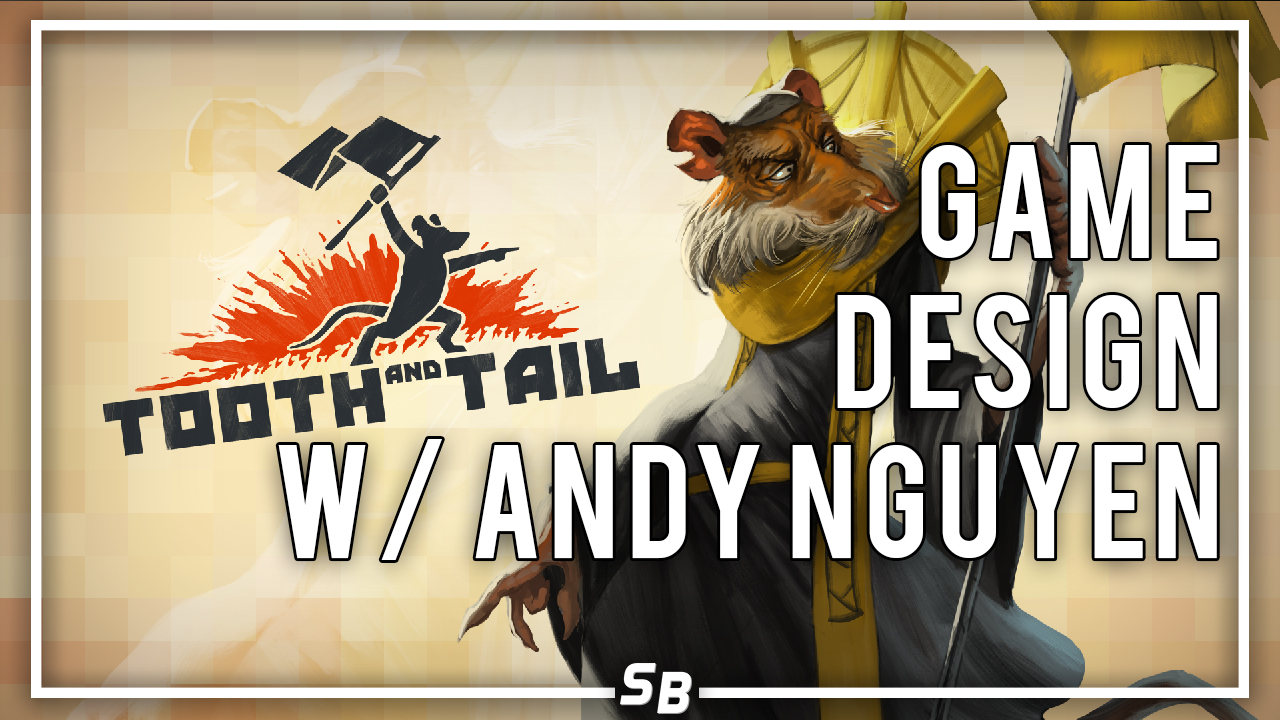
Archamedes, one of the Four commanders and new characters of Tooth & Tail
Game Developer and Designer of Pocketwatch Games, Andy Nguyen. He's worked on several games, most notably Monaco: What's Yours Is Mine and as of recent,Tooth & Tail.
Both of these games are multiplayer. Tooth & Tail is in open Alpha and takes a lot of inspiration from the Super Smash Bros. games.
SmashBoards recently had the privilege to sit down and talk with Andy Nguyen about their own experience with game balance, the Smash Community, and more.
Thirdkoopa: Who are you? Tell us about yourself.
Hello, my name is Andy Nguyen and I'm working on a game called Tooth and Tail. I do a lot of things, but one of my biggest contributions is balancing the game for both casual and competitive play.
Tell us more about Pocketwatch games.
Pocketwatch games was founded by Andy Schatz about 12 years ago. We are most known for winning the IGF Grand Prize in 2010 for a game called Monaco: What's Yours is Mine. Monaco was released in 2013, and since then we have been working on Tooth and Tail. Tooth and Tail is our attempt at bringing the excitement of Real Time Strategy games of the 90s while getting rid of the burdensome interface design that has become synonymous with the genre. It takes place in a World War 1 inspired world of Animal Revolution.
What got you inspired into wanting to make a watchable game?
When we started Tooth and Tail, we weren't specifically trying to make an eSports game, but our goal was to make a game that was just as fun to watch as it was to play. A big part of this inspiration was growing up playing fighting games and being part of the fighting game community. This was way before YouTube or Twitch. Going to Tournaments and watching the best people play against each other was some of the best action I could ask for. We knew Tooth and Tail had that potential because we designed it to have the many layers of strategy that fans of RTS games enjoy.

A screenshot from Tooth & Tail
How was Smash part of that balance?
When I think about playing Smash, I'm suddenly infused with a lot of memories I had trying to get better at the game. For fighting games, there's a lot a of emphasis on understanding the tech required to be good. You won't be able to win at the high level if you don't know about L Canceling, Wave Dashing, DI, etc. I feel like these techniques are common knowledge in the inner circle, but are completely invisible to a new player. It's a little unfortunate because until you cross that threshold of understanding, you can't really compete at a decent level in Smash.
I balance Tooth & Tail around this idea because we feel like all techniques should be transparent and intuitive. There shouldn't be any hidden knowledge that instantly boosts a player's skill over another player. Once we know everyone starts on the same page, it's much easier to balance the high level play.
I could go on forever about it, but that's the shortest answer I can give.
What was it like to balance a game in general? We know you have experience with both, given that Monaco is under your belt as well as Tooth and Tail.
Monaco being cooperative put a little bit less pressure to balance. It's one thing if imbalance creates a negative experience for the other player, but in coop, if someone is imbalanced, they help the team and it's viewed with less salt. The leaderboards in Monaco was where balance really came in, and since each level was designed around a different layout and mechanical theme, the strengths and weaknesses of each character changed per level.
With Tooth and Tail, no one can say for certain right now if balance good or even close. We need a lot of players to really get into the meta. I've done some fun experiments in the past to test the meta, for example, like buffing a unit without telling anyone. The result was, there was an OP unit that everyone thought was underpowered because no one played it. Turns out, when someone finally played it months later, it was incredibly OP. People associate power and pickrates, but if a unit doesn't get picked, people just assume it's weak. Another challenge to balance that's sort of unique to RTS is there's multiple axes of balance. For example, unit composition can matter, but if your position is bad, if your economy is bad, you'll still lose no matter what your composition is. Rock can beat Paper in an RTS if you are winning everywhere else. People tend to forget about this fact, and use individual battles as evidence that a unit needs a buff or a nerf. It's really tricky.
What's it like specifically balancing a competitive game? Involving players in an open Alpha can be rather difficult.
The first community I ever really belonged to was a competitive gaming community, the FGC. Back then, there were no patches or anything. You couldn't even talk to the developers if you wanted to. I approach game balance from the perpsective of who I was when I played. There were things that needed to be changed, fixed, or balanced and I wish I could have done something about it. In today's age we have patches and games as services, but as games get bigger and bigger, developers start listening less with their hearts and more with their wallets. This is a bit of a shame, so I like taking advantage of our startup community culture here. After every tournament I interview the top players and ask them how they feel about the game. We have dedicated channels to discuss balancing and that feedback goes directly into the game. I can set a nerf or buff live in minutes, and change it minutes later. That flexibility is something that other games simply do not have and it let's everyone design the game together.

A screenshot from their previous hit game, Monaco: What's Yours Is Mine
What does your creative process consist of?
I can't really say I have a creative process. To be honest, sometimes it feels like I do things on a whim. A big part of that is as creators, we shouldn't be afraid to try things or experiment. We created our development process such that we can implement new ideas and if they don't work it's okay. Unlike big companies that patch once every 2-3 months or more, we can patch 2-3 in an hour if we have to. This makes making games a lot more fun. Of course, it's even more fun getting the community involved in all this. They are the biggest inspiration for our creative process. We get ideas from them all the time, from new units, new mechanics, and even story ideas.
How did you get yourself into making games?
I've answered this one a dozen times, but here has a better answer.
Is Tooth and Tail coming to a Nintendo Console? Or any of your other games?
Not yet. Read into it all you want.
Release date for Tooth & Tail? What is next for Pocket Watch Games?
We are always looking for new and exciting projects. Tooth & Tail is aiming for a release this year, hopefully sooner than later. Afterwards, we are looking for exciting new projects to consume. The next project could be anything! Stay tuned.
Any advice to inspire creators?
I think a lot of creators will in their hardest moments feel like everything is against them. I can't tell you if you if things will get harder or easier as things go, but what I can say is that every creator gets these moments. Even the most successful people have thought about quitting, or have been told by others that they can't do it.

Promo art of Tooth & Tail.
Where can we find you at? Thank you for your time.
Every Friday on Twitch. We also have pages on Facebook, Twitter, a blog here and our Discord chat here.
My pleasure.

